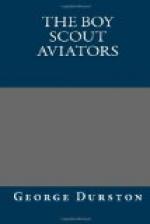They were given with a will — and Harry Fleming joined in as heartily as any of them. He was as much of an American as he had ever been, but something in him responded with a strange thrill to England’s need, as Grenfel had expressed it. After all, England had been and was the mother country. England and America had fought, in their time, and America had won, but now, for a hundred years, there had been peace between them. And he and these English boys were of the same blood and the same language, binding them very closely together. “Blood is thicker than water, after all!” he thought.
Then every scout there shook hands with John Grenfel. He smiled as he greeted them.
“I hope this will pass over,” he said, “and that we’ll do together during this vacation all the things we’ve planned to do. But if we can’t, and if I’m called away, good-bye! Do your duty as scouts, and I’ll know it somehow! And, in case I don’t see you again, good-bye!”
“You’re going to stand with us, then, Fleming?” he said, as Harry came up to shake hands. “Good boy! We’re of one blood, we English and you Americans. We’ve had our quarrels, but relatives always do quarrel. And you’ll not be asked, as a scout here, to do anything an American shouldn’t do.”
Then it was over. They were out in the street. In the distance newsboys were yelling their extra still. Many people were out, something unusual in that quiet neighborhood. And suddenly one of the scouts lifted his voice, and in a moment they were all singing:
Rule, rule, Britannia!
Britannia rules the waves!
Britons never, never, never shall be slaves!
Scores of voices swelled the chorus, joining the fresh young voices of the scouts. And then someone started that swinging march song that had leaped into popularity at the time of the Boer War, Soldiers of the Queen. The words were trifling, but there was a fine swing to the music, and it was not the words that counted — it was the spirit of those who sang.
As he marched along with the others Harry noticed one thing. In a few hours the whole appearance of the streets had changed. From every house, in the still night air, drooped a Union Jack. The flag was everywhere; some houses had flung out half a dozen to the wind.
Harry was seeing a sight, that once seen, can never be forgotten. He was seeing a nation aroused, preparing to fight. If war came to England it would be no war decreed by a few men. It would be a war proclaimed by the people themselves, demanded by them. The nation was stirring; it was casting off the proverbial lethargy and indifference of the English. Even here, in this usually quiet suburb of London, the home of business and professional men who were comfortably well off, the stirring of the spirit of England was evident. And suddenly the song of the scouts and those who had joined them was drowned out by a new noise, sinister, threatening. It was the angry note that is raised by a mob.




